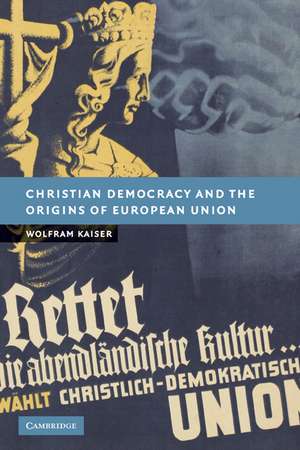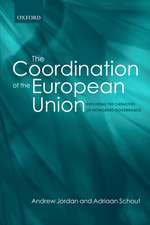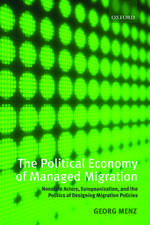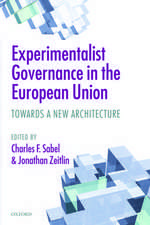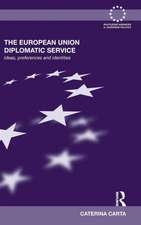Christian Democracy and the Origins of European Union: New Studies in European History
Autor Wolfram Kaiseren Limba Engleză Paperback – 2 mar 2011
| Toate formatele și edițiile | Preț | Express |
|---|---|---|
| Paperback (1) | 349.32 lei 6-8 săpt. | |
| Cambridge University Press – 2 mar 2011 | 349.32 lei 6-8 săpt. | |
| Hardback (1) | 760.32 lei 6-8 săpt. | |
| Cambridge University Press – 28 noi 2007 | 760.32 lei 6-8 săpt. |
Din seria New Studies in European History
-
 Preț: 238.02 lei
Preț: 238.02 lei -
 Preț: 237.92 lei
Preț: 237.92 lei -
 Preț: 208.49 lei
Preț: 208.49 lei - 9%
 Preț: 593.70 lei
Preț: 593.70 lei -
 Preț: 398.41 lei
Preț: 398.41 lei -
 Preț: 177.91 lei
Preț: 177.91 lei -
 Preț: 211.13 lei
Preț: 211.13 lei - 9%
 Preț: 592.60 lei
Preț: 592.60 lei -
 Preț: 169.70 lei
Preț: 169.70 lei -
 Preț: 166.99 lei
Preț: 166.99 lei -
 Preț: 266.53 lei
Preț: 266.53 lei -
 Preț: 241.90 lei
Preț: 241.90 lei -
 Preț: 429.99 lei
Preț: 429.99 lei -
 Preț: 400.05 lei
Preț: 400.05 lei - 11%
 Preț: 698.50 lei
Preț: 698.50 lei -
 Preț: 275.85 lei
Preț: 275.85 lei -
 Preț: 330.09 lei
Preț: 330.09 lei - 11%
 Preț: 695.93 lei
Preț: 695.93 lei -
 Preț: 423.10 lei
Preț: 423.10 lei -
 Preț: 340.13 lei
Preț: 340.13 lei - 11%
 Preț: 698.30 lei
Preț: 698.30 lei -
 Preț: 326.82 lei
Preț: 326.82 lei -
 Preț: 339.37 lei
Preț: 339.37 lei -
 Preț: 396.59 lei
Preț: 396.59 lei -
 Preț: 383.48 lei
Preț: 383.48 lei -
 Preț: 292.40 lei
Preț: 292.40 lei - 14%
 Preț: 682.94 lei
Preț: 682.94 lei -
 Preț: 282.75 lei
Preț: 282.75 lei -
 Preț: 417.07 lei
Preț: 417.07 lei -
 Preț: 437.18 lei
Preț: 437.18 lei - 14%
 Preț: 873.67 lei
Preț: 873.67 lei -
 Preț: 420.40 lei
Preț: 420.40 lei -
 Preț: 319.99 lei
Preț: 319.99 lei - 14%
 Preț: 687.39 lei
Preț: 687.39 lei -
 Preț: 397.01 lei
Preț: 397.01 lei - 11%
 Preț: 695.93 lei
Preț: 695.93 lei - 11%
 Preț: 543.84 lei
Preț: 543.84 lei
Preț: 349.32 lei
Nou
Puncte Express: 524
Preț estimativ în valută:
66.85€ • 69.70$ • 55.56£
66.85€ • 69.70$ • 55.56£
Carte tipărită la comandă
Livrare economică 21 martie-04 aprilie
Preluare comenzi: 021 569.72.76
Specificații
ISBN-13: 9780521173971
ISBN-10: 0521173973
Pagini: 390
Dimensiuni: 152 x 229 x 22 mm
Greutate: 0.57 kg
Editura: Cambridge University Press
Colecția Cambridge University Press
Seria New Studies in European History
Locul publicării:Cambridge, United Kingdom
ISBN-10: 0521173973
Pagini: 390
Dimensiuni: 152 x 229 x 22 mm
Greutate: 0.57 kg
Editura: Cambridge University Press
Colecția Cambridge University Press
Seria New Studies in European History
Locul publicării:Cambridge, United Kingdom
Cuprins
Introduction; 1. All paths to Rome? Transnational Catholicism in the nineteenth century; 2. Under siege: Catholic parties in interwar Europe; 3. After Versailles: left-Catholic cooperation; 4. In the shadow of dictatorship: contacts in exile; 5. Hegemony by default: Christian democracy in postwar Europe; 6. Creating core Europe: the rise of the party network; 7. Deepening integration: the supranational coalition embattled; 8. Informal politics: from Rome to Maastricht.
Recenzii
Review of the hardback: 'Kaiser's survey impresses for its analytical incisiveness and chronological and geographic scope.' Central European History
Review of the hardback: 'Kaiser offers a detailed yet extremely clear institutional history that effectively highlights the personal contacts and relationships among integration's supporters.' Central European History
'… a landmark contribution to contemporary European history. [This book] should find a secure place on reading lists for advanced undergraduate and graduate courses on the history of Cold War Europe. Kaiser makes a valuable contribution to recent literature showing that European integration processes did not start in 1945 … Historians of the Cold War will read this book with great interest, for it presents an important and imaginatively construed way of transcending the differences between diplomatic and domestic social and political history. Kaiser's book powerfully demonstrates that the history of the Cold War, like that of European integration, is embedded in a much richer trajectory than historicist assumptions about historical epochs suggest.' Journal of Cold War Studies
Review of the hardback: 'Kaiser offers a detailed yet extremely clear institutional history that effectively highlights the personal contacts and relationships among integration's supporters.' Central European History
'… a landmark contribution to contemporary European history. [This book] should find a secure place on reading lists for advanced undergraduate and graduate courses on the history of Cold War Europe. Kaiser makes a valuable contribution to recent literature showing that European integration processes did not start in 1945 … Historians of the Cold War will read this book with great interest, for it presents an important and imaginatively construed way of transcending the differences between diplomatic and domestic social and political history. Kaiser's book powerfully demonstrates that the history of the Cold War, like that of European integration, is embedded in a much richer trajectory than historicist assumptions about historical epochs suggest.' Journal of Cold War Studies
Descriere
This book considers the role of European Christian democratic parties in the making of the European Union.
